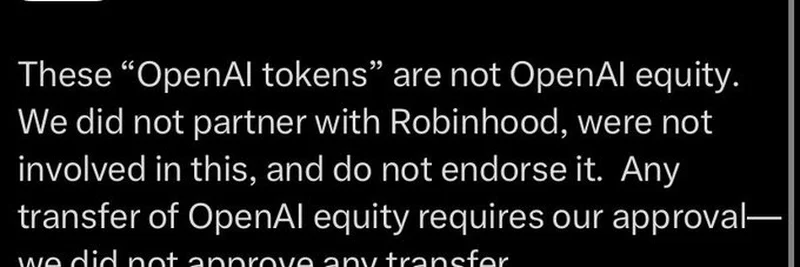Hey there, crypto curious! If you’ve been scrolling through X lately, you might have stumbled upon a wild thread from @S4mmyEth that’s got everyone talking. It all kicks off with a stark warning from OpenAI’s Newsroom, claiming that the so-called “OpenAI tokens” floating around on Robinhood aren’t legit. Let’s break it down and figure out what’s going on, especially for those of us diving into the wild world of meme tokens and blockchain tech.
What’s the Buzz About?
On July 2, 2025, OpenAI dropped a bombshell tweet, stating that these “OpenAI tokens” aren’t actual equity in their company. They didn’t partner with Robinhood, didn’t greenlight this move, and aren’t endorsing it. Any transfer of OpenAI equity needs their approval—something they didn’t give. The message? “Please be careful.” S4mmyEth picked up on this and called it a “TradFi exit liquidity and rugged within a 48 hour period,” hinting at a potential rug pull—a sneaky move where investors get left high and dry.
What Are These Tokens, Anyway?
So, what’s the deal with these tokens? Robinhood has been experimenting with stock tokens, which are like digital stand-ins for shares, tracked on the blockchain. They’re not the real deal—more like a bet on the company’s value, backed indirectly through a special purpose vehicle (SPV), a legal setup to separate financial risks. Think of it like a middleman holding the shares, and the token mirrors that value. But here’s the catch: OpenAI says they didn’t sign off on this, which throws a wrench into the whole setup.
The Controversy Unfolds
S4mmyEth’s thread dives deeper, quoting other X users and piecing together the puzzle. Some speculate that Robinhood might have a private deal with a wealthy investor who owns OpenAI shares, bypassing OpenAI’s approval. Others, like @amitisinvesting, clarify that these tokens are more like synthetic bets (think Polymarket-style predictions) rather than actual ownership with voting rights or dividends. Robinhood later confirmed the tokens are tied to their stake in an SPV, not direct shares, adding fuel to the debate.
Is This a Rug Pull in the Making?
The term “rug pull” comes from DeFi, where scammers hype a token, lure investors, then vanish with the funds. S4mmyEth’s take suggests this could be a TradFi (traditional finance) version—fast liquidity, quick exit, and investors left holding worthless tokens. The thread’s poll from @0xDeployer even jokes about it being “poetic justice” or “natural selection,” reflecting the community’s mixed feelings. With OpenAI’s disclaimer, it’s clear there’s a risk if the tokens aren’t backed by anything solid.
What Does This Mean for Meme Token Fans?
If you’re into meme tokens or blockchain investing, this is a wake-up call. Meme tokens often thrive on hype, but this OpenAI-Robinhood saga shows even big players can stir confusion. Always do your own research (DYOR) and check where your money’s going. Tools like on-chain monitoring can help spot red flags, whether it’s a DeFi scam or a TradFi misstep. This incident highlights the blurry line between innovative tokenization and risky speculation.
Final Thoughts
As of 09:15 AM +07 on July 3, 2025, this story’s still unfolding. The OpenAI warning and S4mmyEth’s thread remind us that the crypto space—meme tokens included—moves fast and can get messy. Stay sharp, keep learning, and maybe hold off on jumping into unverified tokens. Got thoughts? Drop them in the comments or join the chat on meme-insider.com to dive deeper into this wild ride!



